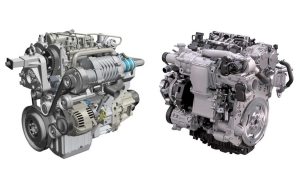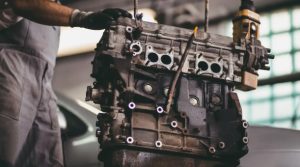The debate between diesel and gasoline engines has been ongoing since the early days of the automobile. While both serve the same fundamental purpose — to convert fuel into energy that powers a vehicle — they operate differently, use distinct components, and suit different driving needs. In this article, we’ll explore the key differences between diesel and gasoline engines, highlight variations in components, and help you understand which engine type may be better for your needs.
Basic Operational Differences

At their core, both diesel and gasoline engines are internal combustion engines, but they differ in how they ignite fuel and how their systems are constructed.
| Feature | Diesel Engine | Gasoline Engine |
|---|---|---|
| Ignition Type | Compression ignition | Spark ignition |
| Fuel Injection | Direct injection into the combustion chamber | Port or direct injection with spark plug ignition |
| Fuel Type | Diesel fuel (higher energy density) | Gasoline (more volatile and lighter) |
| Efficiency | More efficient, especially at low RPM | Slightly less efficient, better for high-speed driving |
| Torque Output | Higher torque, good for towing and heavy-duty use | Lower torque but often higher horsepower |
| Operating Temperature | Runs hotter but built to withstand higher pressure | Lower combustion temperature |
| Maintenance | Requires heavy-duty components and regular fuel system checks | Generally easier and less costly to maintain |
Key Component Variations
Although both engine types share some components, many of these parts differ in design and function due to the nature of diesel vs. gasoline combustion.
1. Fuel Injectors
-
Diesel: Operates under extremely high pressure (up to 30,000 psi), requires precise timing.
-
Gasoline: Typically uses lower pressure and can be port or direct injected.
2. Glow Plugs vs. Spark Plugs
-
Diesel: Uses glow plugs to preheat air in cold conditions—essential for starting.
-
Gasoline: Uses spark plugs to ignite the air-fuel mixture during every combustion cycle.
3. Pistons and Cylinder Heads
-
Diesel: Thicker and stronger to withstand high compression.
-
Gasoline: Lighter, optimized for speed rather than torque.
4. Compression Ratio
-
Diesel Engines: Typically 14:1 to 25:1.
-
Gasoline Engines: Around 8:1 to 12:1.
Common Applications for Each Engine Type
Choosing between diesel and gasoline often depends on how and where you plan to use your vehicle.
| Use Case | Best Option | Why |
|---|---|---|
| Daily commuting | Gasoline engine | Quieter, cheaper fuel, easier to maintain |
| Long-distance driving | Diesel engine | Better fuel economy on highways |
| Heavy-duty towing | Diesel engine | More torque, high load handling |
| City driving | Gasoline engine | Lighter, more responsive in start-stop traffic |
| Cold climates | Gasoline engine | Easier starts, fewer issues with gelling fuel |
Pros and Cons of Each Engine Type
Diesel Engine Pros:
-
Superior fuel efficiency for long distances
-
Higher torque for towing and heavy loads
-
Longer engine lifespan with proper maintenance
Diesel Engine Cons:
-
More expensive upfront and costlier parts
-
Heavier emissions control systems (e.g., DPF, SCR)
-
Harder to start in cold weather
Gasoline Engine Pros:
-
Quieter and smoother operation
-
Lower vehicle purchase cost
-
Easier to find mechanics and cheaper repairs
Gasoline Engine Cons:
-
Less fuel-efficient over long distances
-
Shorter engine life under high-stress conditions
Maintenance Tips for Both Engine Types
| Component | Diesel Maintenance Tip | Gasoline Maintenance Tip |
|---|---|---|
| Fuel System | Use clean diesel and change fuel filters regularly | Replace fuel filters based on interval, avoid low-octane fuel |
| Air Filters | Check more frequently due to intake volume | Standard inspection every 10,000–15,000 km |
| Oil & Filters | Change with heavy-duty oil suitable for diesel combustion | Use manufacturer-recommended oil, change every 5,000–10,000 km |
| Exhaust System | Watch for clogging in the diesel particulate filter (DPF) | Inspect catalytic converter for clogs or damage |
| Starting System | Test glow plugs regularly, especially in winter | Replace spark plugs every 30,000–100,000 km (based on type) |
Need Replacement Engine Parts?

No matter which engine you have, maintaining it with high-quality parts is essential. Whether you’re looking for fuel injectors, glow plugs, cylinder heads, or oil filters:
This store offers a wide range of certified, durable engine parts compatible with diesel and gasoline engines across various car brands. Enjoy quick delivery and precision-fit components.
Conclusion
Both diesel and gasoline engines have their strengths and weaknesses. Diesel engines excel in efficiency and power, making them ideal for heavy-duty applications and long drives. Gasoline engines offer smooth performance, easier maintenance, and better suitability for urban environments.
Understanding the key differences helps you make informed decisions about vehicle choice, maintenance routines, and replacement part selection. Always ensure you’re using the correct components for your engine type to maximize performance and longevity.
Have questions about specific engine parts? Let me know if you’d like a comparison table of components for specific car brands or a downloadable checklist for engine maintenance.